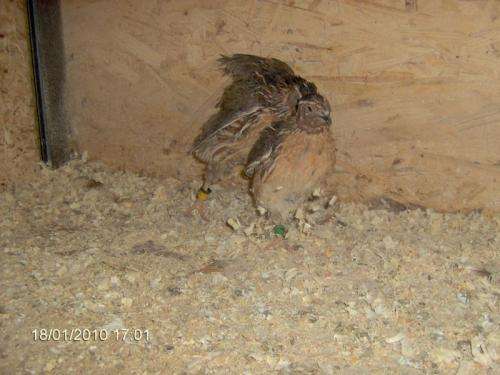In fights between rivalling male quails, the presence of an audience directly influences the future success of the animals involved in the fight. Credit: K. Hirschenhauser
For animals, prevailing in a fight affects their likelihood of winning future conflicts. The opposite is true of losing a fight. The sex hormone testosterone is often believed to mediate this "winner effect". Researchers from the Max Planck Institute for Ornithology in Seewiesen have examined whether the presence of an audience influences the behaviour and the testosterone changes of Japanese quails (Coturnix japonica) after a fight. The evidence shows that both winners and losers exhibit raised testosterone levels after a conflict without an audience.
Furthermore, both winners and losers are able to maintain their social status within their group. With an audience, on the other hand, this remained true for winners, but was not the case for losers: those who had lost had neither raised testosterone levels nor were they able to maintain their dominant status within the group. Thus, informed audiences determine the future social status of a male, while testosterone plays a secondary role.
Battles for territory and mating partners are widespread in the animal world and are usually fought by males. The sex hormone testosterone thereby plays a crucial role. The concentration of this substance often rises dramatically during a fight. However, the social environment in which the rivals fight their battle can change the context and affect the role of testosterone for maintaining dominance. Experience plays a role, for instance, how often the opponents got involved in a conflict and whether they have met before. Of crucial importance can also be whether the fight is watched by spectators. Audiences can have a decisive effect on the outcome of a contest between humans, too.
While the fights can get quite heavy and "hands-on", the combatants very rarely suffer any injuries. Credit: K. Hirschenhauser
With support of the Alexander-von-Humboldt Society, scientists working with Katharina Hirschenhauser from the Max Planck Institute for Ornithology in Seewiesen have been studying the influence of mixed-sex audiences on future social status after a fight. They kept quails in social groups each consisting of two males (one dominant and one subordinate) and three females. The scientists observed fights between two dominant male quails in a central arena. The members of the respective social group either were allowed to watch the fight or not. During the fighting phase, which lasted an average of seven minutes, the eventual winners attacked their rivals 29 times on average. Although the fights are naturally pretty rough, none of the combatants got seriously injured.
The winners, without exception, retained their dominant status ("the winner effect"). The losers, on the other hand, were often "beaten up" by the previously subordinate male after returning to their social group and on a long-term lost their dominant status ("the loser effect"). Where there was no audience present, however, even the losers were able to maintain their dominant status.
As expected, testosterone levels were raised after the fight when there was no audience. This happened regardless of whether the quails had won or lost. After a fight in front of an audience, though, the losers had lower testosterone levels. The winners, on the other hand, showed a similar increase to quails that had fought without an audience. In order to determine whether a change in status after losing a fight in front of an audience could be physiologically prevented, the scientists treated the losers immediately after the fight with a testosterone cream on the skin. This treatment seriously influenced the birds' aggressive behaviour: the losers were chasing the subordinate male in the group to a greater extent, which enabled them to remain dominant. This seems to indicate that testosterone is a mediator of the "winner effect" – or at the loser's side, its lack has an influence on future success.
However, the scientists went a step further: They injected the winners with a testosterone blocker directly after the fight and observed their behaviour in the social group. Although, through the blocker, the testosterone had no effect on these birds temporarily, the winners were still able to maintain their social status. "Apparently, the information about a fight essentially determines the loser's future status in its group. The "winner effect", in contrast, is independent of testosterone and audiences," says Katharina Hirschenhauser, lead author of the study. Next, the scientists would like to test the direction of information use, in other words how the combatants behave if they do not see the audiences, but the observers are fully informed about the fight's outcome.
More information: Katharina Hirschenhauser, Manfred Gahr, Wolfgang Goymann, Winning and losing in public: Audiences direct future success in Japanese quail, Hormones & Behaviour 27 February 2013 pii: S0018-506X(13)00045-7. doi: 10.1016/j.yhbeh.2013.02.010
Provided by Max Planck Society





















